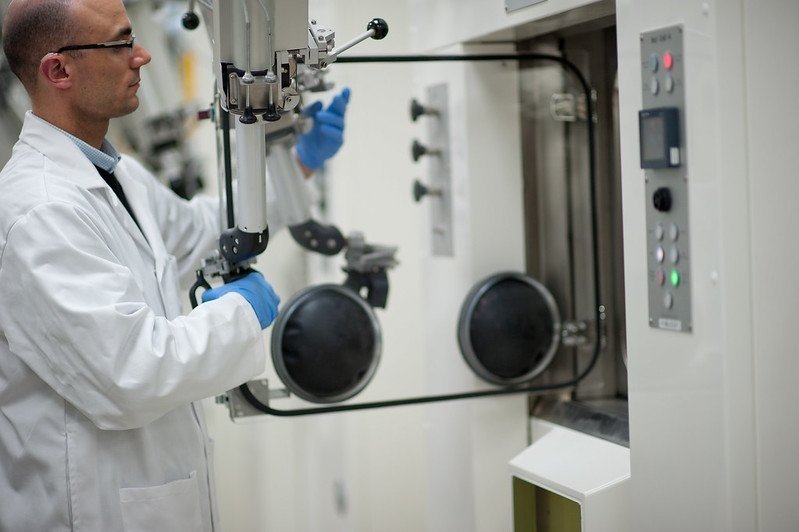OUR RESEARCH
With access to the world’s broadest range of cyclotron energies, from 13 to 500 MeV, TRIUMF Life Science produces a diverse mix of radioisotopes using gas, liquid and solid targets.
The TR13 cyclotron uses any one of gas, liquid or solid targets to produce a variety of radioisotopes, including our staples - C-11 and F-18 – or a wide variety of emerging metallic radionuclides, including Zr-89, Ga-68, Cu-64 and Sc-44. New interests include Sb-119 and Hg-197. At higher energies, the main 500 MeV cyclotron is used with solid targets to produce a variety of experimental metal medical isotopes, including isotopes of titanium, actinium, bismuth and radium.
For radiochemistry research, TRIUMF Life Science operates radiochemistry labs with four state-of-the-art hot cells, or radiation-shielded, robotic-arm accessed chemistry stations. Scientists access a hot cell's interior using a sophisticated robotic arm that enables them to manipulate glassware and other tools for conducting detailed radiochemical experiments and manipulating the manufacturing systems. This includes developing the purification chemistry for potential new radioisotopes.
Medical Isotopes
Lab 007
Diagnostic Radiopharmaceuticals
The Radiopharmaceutical Production Group at TRIUMF is focusing on the production and development of radiopharmaceuticals used in brain research and other programs at UBC and BC Cancer (BCC). To accomplish this, the group relies on the TR13 cyclotron and target systems for the production of isotopes like flourine-18 and carbon-11. Additionally, three chemistry labs (005, 007, and 103) located in the Chemistry Annex are used for the radiopharmaceutical production and quality control processes.
The radiopharmaceuticals produced by the Radiopharmaceutical Production Group are prepared following Good Manufacturing Practices (GMP) guidelines. Operating following these guidelines ensures that the radiopharmaceuticals are consistently produced in a controlled manner and that they meet quality standards for their intended use in humans. The radiopharmaceuticals are processed inside of hot cells to shield the radioactivity during processing, and inside of clean rooms to ensure the GMP integrity of the drugs. The radiopharmaceutical production and quality control work is carried out following the requirements of TRIUMF and TRIUMF Life Sciences’ Quality Management Systems, TRIUMF’s Canadian Nuclear Safety Commission license conditions, and Health Canada’s GMP guidelines.
The majority of the tracer compounds produced by the Radiopharmaceutical Production Group at TRIUMF are used for the PET-MRI Imaging Center, a joint UBC/TRIUMF PET imaging program dedicated primarily to imaging research on Parkinson’s disease. The research areas at the PET-MRI Imaging Center also include Alzheimer’s disease, brain injury and healthy ageing, dementia, multiple sclerosis, mood disorders and addiction with a strong emphasis on synergies. The Radiopharmaceutical Group also supports the studies utilizing a Siemens Focus 120 microPET scanner at the PET-MRI Imaging Center. Most of the studies performed on the microPET complement the studies performed on human subjects with the primary focus being on movement disorders.
GMP Lab
TR-13 Cyclotron
Radiopharmaceutical Production Group
Brain metabolism using the radiotracer 18F-FDG
Therapeutic Radiopharmaceuticals
An alpha-emitting isotope with a short half-life, actinium-225 can be combined with a protein or antibody that specifically targets and kills cancer cells; the cancer-specific molecules seek out and destroy preferably cancer cells while leaving the surrounding healthy tissue unharmed.
With a short half-life of just ten days, the actinium then decays without significantly accumulating in a patient’s body. Known as targeted alpha therapy (TAT), this form of treatment has shown exciting potential in early studies with prostate cancer patients for whom conventional cancer therapies have not worked.
After having demonstrated the Ac-225 capabilities at TRIUMF in 2019, the Life Sciences division has assembled a team to work towards the production of Ac-225 in clinically relevant quantities. A first test irradiation and processing run is scheduled for later in 2020.
In addition, we are exploring the isotope Ac-226, which can be used as an imaging radionuclide to the therapeutic Ac-225, forming a theranostic pair. The main challenge and limitation are that Ac-226 can only be produced in few ISOL facilities around the world, including the ISAC facility of TRIUMF.
In September 2020, our TRIUMF Life Sciences Division, and Accelerator Division team collaboratively performed the first-ever successful collection and isolation of The isotope was produced in a uranium carbide target at the ISAC rare ion beam facility. Mass 226 of the ion beam was separated and collected at the ISAC implantation station. At the end of the beam after 32 hours collection, around 25 MBq 226Ac was accumulated. New implantation strategy based on depositing the ion beam in a layer of salt (NH4Cl) sublimated on the surface of the implantation target. This enables simple recovery by adding water and minimizes the presence of stable impurities which may affect future radiopharmaceutical application. More than 95% of Ac-226 was recovered.
Hot Cell Lab
Hot Cell Lab
External Beam Radiotherapy
50% of cancer patients in BC receive radiotherapy, either alone or in combination with surgery and/or chemotherapy. But radiotherapy, while a powerful tool to kill cancer, also has many side effects and is therefore not available to all patients or can lead to subsequent reoccurrence or secondary cancer, putting a significant strain onto the health care system. The aim for most research into radiotherapy is to increase the therapeutic index of the treatment, allowing to effectively kill the cancer cells while keeping the side effects as low as possible to avoid complications. This can be done via better control of the treatment delivery, by having better detection methods to determine the dosimetry of the treatment, or by exploring novel treatment beam options. This project is a summary of experiments covering different aspects of irradiations for medical physics. These experiments have been submitted and have been approved by the MMS-EEC as they require beam time at the PIF&NIF facilities. They are included here as they are carried out in the Life Sciences division. Four experiments (M****) are currently active. One additional FLASH experiment takes place at the ARIEL facility.
Proton Irradiation
Student and Post Doc Opportunities
We are training the next generation of researchers, educators, and innovators. Click here to learn more about different Undergraduate, Graduate, and Postdoc opportunities at TRIUMF.









